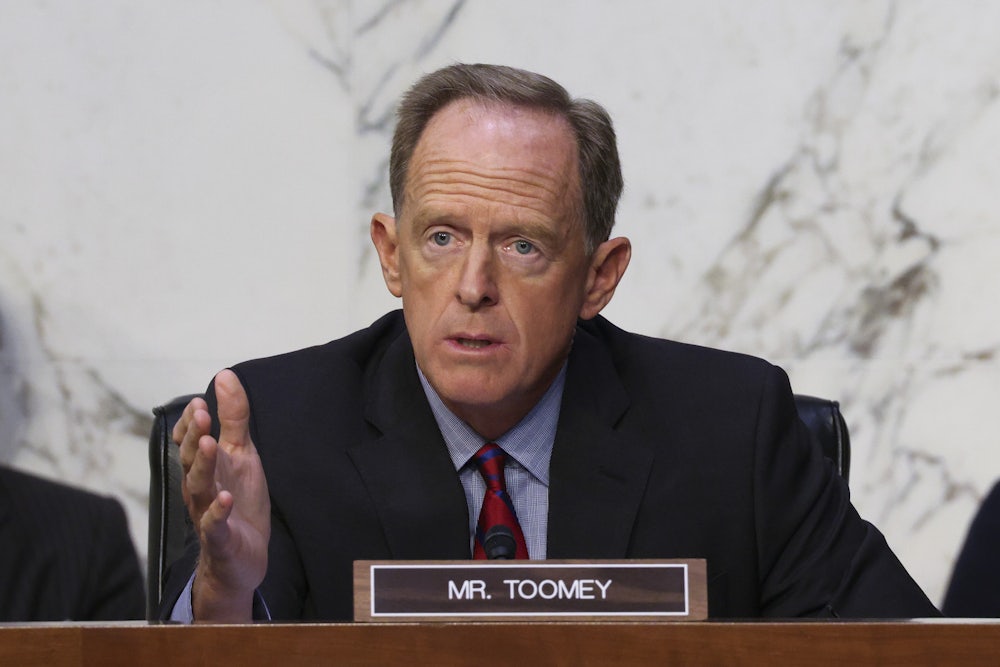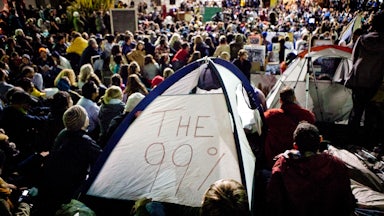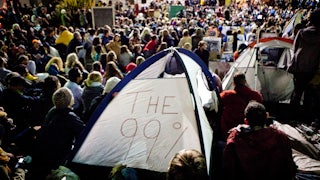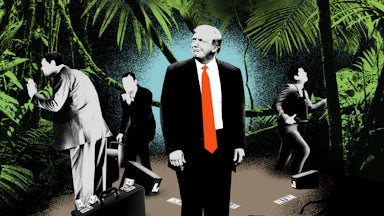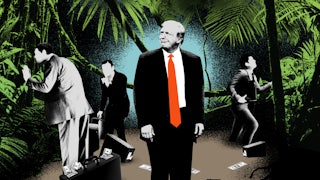Wall Street has launched an all-out attack on Saule Omarova, President Biden’s nominee to be the primary regulator of big banks. But the financial industry’s lobbyists in Washington aren’t being honest about why she gets their hackles up. The truth is that Omarova, a distinguished law professor at Cornell and a former bank lawyer who worked in the George W. Bush Treasury Department, knows the ins and outs of a multi-billion-dollar profit center for big banks, one which they don’t want anyone but their own lawyers to understand: the derivatives market—a key engine of the calamitous financial crash of 2007 and 2008.
Put simply, Omarova knows where Wall Street’s skeletons are buried. She could soon—alas, probably not before Halloween—be in the perfect position to exhume those bones as head of the Office of the Comptroller of the Currency, or OCC, the regulator of U.S. national banks. If the banking lobby ever tried to engage with Omarova’s arguments in good faith, they’d never win the debate. She’s right, and they know it.
That’s why, since late September, Wall Street lobbyists, Republicans, and other big-bank advocates have waged an ugly McCarthy-like smear campaign against Omarova. It kicked off with Sen. Pat Toomey, the self-appointed ringleader of her tormentors, who declared on the Senate floor that Omarova was born in the former Soviet Union and attended university in Moscow, as if either of those things should be considered scandalous.
Senator Toomey did not express any similar misgivings when the Senate Banking Committee approved President Trump’s nomination of Jelena McWilliams to become FDIC Chairman in January 2018. Toomey praised McWilliams as a “terrific” nominee, even though she grew up in Communist Yugoslavia.
Omarova has responded publicly to Toomey’s attacks, something nominees seldom do, and explained that her grandmother’s entire family died in Stalinist purges and she became an “anti-communist” as a university student.
And she said something else, rather pointedly: “I am an easy target: an immigrant, a woman, a minority.” The banking industry has gone out of its way in recent years to project that its leaders aren’t racists, sexists, or xenophobes. Yet Wall Street and its lobbyists have tolerated a bigoted campaign against Omarova at best, and fed it at worst. All of this is simply an attempt to shift the conversation away from Omarova’s unquestioned expertise and what she might actually do if confirmed.
Those looking for the source of Wall Street’s outrage won’t find it hidden in the shadows of the Cold War. It’s actually all laid out in plain English in a law review article Omarova published in the summer of 2009, shortly after the global financial meltdown, titled “The Quiet Metamorphosis: How Derivatives Changed ‘The Business Of Banking.’” The title of that article comes from a section of the National Bank Act that permits federally-chartered banks to exercise any powers “necessary to carry on the business of banking.”
That’s a pretty vague phrase. While the statute gives a few examples of what “the business of banking” is—taking deposits, making loans, and so on—it never explicitly states what “the business of banking” is not. Omarova’s law article documents how Wall Street seized on this one phrase and used it to push the OCC, a notoriously pro-industry agency under most Comptrollers, into allowing banks to deal in derivatives, complex financial instruments whose values are determined by reference to other assets or financial rates or indexes.
The OCC widened its interpretation of “the business of banking” through a series of letters from the early 1980’s to the mid-2000’s. During that time period, banks went from only engaging in what the National Bank Act explicitly says they can do to operating whole trading floors focused on derivatives.
Derivatives don’t provide capital to the real economy. They can help to hedge against investments or markets going south (they find their origin in agricultural futures markets, where investors frequently had to account for, and hedge against, wild fluctuations in the future expected spot prices of various commodities). However, derivatives are more often used as vehicles for speculation. They don’t provide average people with money to start a business, or for a family to buy a home. In Omarova’s words, the OCC interpretive letters transformed Wall Street into “creators of, dealers, traders, and investors in pure financial risk, regardless of its specific form or source.” Wall Street’s casino was wide open.
During the early 2000s, big banks used their OCC-approved derivatives authority to create many new types of complicated, high-risk derivatives, including credit default swaps, or CDS, and synthetic collateralized debt obligations, or CDOs, two types of financial instruments that fueled the subprime mortgage meltdown of 2007 and 2008.
In this way, derivatives have become “financial weapons of mass destruction”—Warren Buffett’s famous phrase—and they can involve fantastical, margin call-busting, sums of money. According to the latest quarterly report by the OCC itself, banks made $8.1 billion in revenue on derivatives in a the second quarter of this year alone. The notional value (definition here) of these derivatives is a mind-blowing $185 trillion.
Most importantly, the five largest U.S. banks (JPMorgan Chase, Bank of America, Citigroup, Goldman Sachs, and Wells Fargo) control 95 percent of the derivatives market, and the top 25 banks control over 99 percent of that market. This is not a business that serves ordinary Main Street interests, and it isn’t conducted by small community banks.
Big banks were only allowed to enter these derivative markets thanks to the OCC’s ever-expanding interpretation of “the business of banking.” The OCC did not adopt formal regulations, subject to open debate and public comment, but instead issued a series of technical administrative rulings that few people but bank lawyers could grasp. Fortunately, Omarova was one of them. Her deeply-informed scholarship contributed to the 2010 Dodd-Frank Act’s reform of derivatives regulation. That reform has been good for the country, as it provided at least some lines of defense against derivative-based destruction. Dodd-Frank’s reform did not go far enough, however. Congress tried to ban banks from operating derivatives trading desks in the Lincoln Amendment that was attached to the Dodd-Frank legislation Act. However, Citigroup lobbyists literally wrote the bill that overturned that provision in 2014.
Working people haven’t shared in the enormous trading profits that Wall Street banks have accrued in recent decades, but they have certainly absorbed plenty of losses from global economic crises triggered by Wall Street’s speculative risk-taking. Putting people like Omarova in charge of overseeing Wall Street banks and their massive derivatives operations is the kind of thing that should animate the presidency of Joe Biden, who promised to nominate a diverse slate of regulators who would hold Wall Street accountable.
The threat of having a strong regulator who understands how their Wall Street casino operates has truly exposed the extraordinary depths of mendacity to which the megabanks can sink; their xenophobic, McCarthy-like campaign designed to derail the nomination of a superbly qualified immigrant woman of color is almost cartoonish in its villainy. It’s incumbent on Senate Democrats to reject this vicious campaign and to support Omarova, because she is precisely the kind of independent, reform-minded regulator who can head off the next financial catastrophe before it begins.
